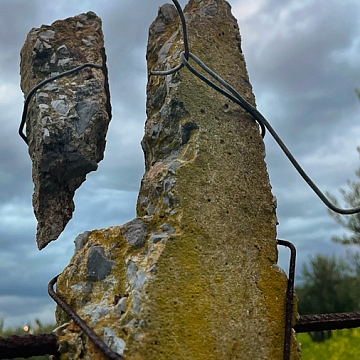This is a default settings.local.php file that I always use combined with the default settings.ddev.php.
At the end of settings.php I have this
if (file_exists($app_root . '/' . $site_path . '/settings.local.php')) {
include $app_root . '/' . $site_path . '/settings.local.php';
}
// Automatically generated include for settings managed by ddev.
if (file_exists(__DIR__ . '/settings.ddev.php') && getenv('IS_DDEV_PROJECT') == 'true') {
include __DIR__ . '/settings.ddev.php';
}
And then at web/sites/default/ The file settings.local.php
<?php
// phpcs:ignoreFile
ini_set('display_errors', 1);
ini_set('display_startup_errors', 1);
$config['system.logging']['error_level'] = 'verbose';
$settings['skip_permissions_hardening'] = TRUE;
/**
* Disable CSS and JS aggregation.
*/
$config['system.performance']['css']['preprocess'] = FALSE;
$config['system.performance']['js']['preprocess'] = FALSE;
/**
* Enable local development services.
*/
$settings['container_yamls'][] = DRUPAL_ROOT . '/sites/development.services.yml';
/**
* Show all error messages, with backtrace information.
*
* In case the error level could not be fetched from the database, as for
* example the database connection failed, we rely only on this value.
*/
$config['system.logging']['error_level'] = 'verbose';
/**
* Disable CSS and JS aggregation.
*/
$config['system.performance']['css']['preprocess'] = FALSE;
$config['system.performance']['js']['preprocess'] = FALSE;
/**
* Disable the render cache.
*
* Note: you should test with the render cache enabled, to ensure the correct
* cacheability metadata is present. However, in the early stages of
* development, you may want to disable it.
*
* This setting disables the render cache by using the Null cache back-end
* defined by the development.services.yml file above.
*
* Only use this setting once the site has been installed.
*/
$settings['cache']['bins']['render'] = 'cache.backend.null';
/**
* Disable caching for migrations.
*
* Uncomment the code below to only store migrations in memory and not in the
* database. This makes it easier to develop custom migrations.
*/
$settings['cache']['bins']['discovery_migration'] = 'cache.backend.memory';
/**
* Disable Internal Page Cache.
*
* Note: you should test with Internal Page Cache enabled, to ensure the correct
* cacheability metadata is present. However, in the early stages of
* development, you may want to disable it.
*
* This setting disables the page cache by using the Null cache back-end
* defined by the development.services.yml file above.
*
* Only use this setting once the site has been installed.
*/
$settings['cache']['bins']['page'] = 'cache.backend.null';
/**
* Disable Dynamic Page Cache.
*
* Note: you should test with Dynamic Page Cache enabled, to ensure the correct
* cacheability metadata is present (and hence the expected behavior). However,
* in the early stages of development, you may want to disable it.
*/
$settings['cache']['bins']['dynamic_page_cache'] = 'cache.backend.null';
/**
* Allow test modules and themes to be installed.
*
* Drupal ignores test modules and themes by default for performance reasons.
* During development it can be useful to install test extensions for debugging
* purposes.
*/
# $settings['extension_discovery_scan_tests'] = TRUE;
/**
* Enable access to rebuild.php.
*
* This setting can be enabled to allow Drupal's php and database cached
* storage to be cleared via the rebuild.php page. Access to this page can also
* be gained by generating a query string from rebuild_token_calculator.sh and
* using these parameters in a request to rebuild.php.
*/
$settings['rebuild_access'] = TRUE;
/**
* Skip file system permissions hardening.
*
* The system module will periodically check the permissions of your site's
* site directory to ensure that it is not writable by the website user. For
* sites that are managed with a version control system, this can cause problems
* when files in that directory such as settings.php are updated, because the
* user pulling in the changes won't have permissions to modify files in the
* directory.
*/
$settings['skip_permissions_hardening'] = TRUE;
/**
* Exclude modules from configuration synchronization.
*
* On config export sync, no config or dependent config of any excluded module
* is exported. On config import sync, any config of any installed excluded
* module is ignored. In the exported configuration, it will be as if the
* excluded module had never been installed. When syncing configuration, if an
* excluded module is already installed, it will not be uninstalled by the
* configuration synchronization, and dependent configuration will remain
* intact. This affects only configuration synchronization; single import and
* export of configuration are not affected.
*
* Drupal does not validate or sanity check the list of excluded modules. For
* instance, it is your own responsibility to never exclude required modules,
* because it would mean that the exported configuration can not be imported
* anymore.
*
* This is an advanced feature and using it means opting out of some of the
* guarantees the configuration synchronization provides. It is not recommended
* to use this feature with modules that affect Drupal in a major way such as
* the language or field module.
*/
$settings['config_exclude_modules'] = ['devel', 'stage_file_proxy'];
/**
* Sets up Drupal to ignore node_modules and bower_components.
* Drupal may look for twig templates inside these directories and
* could cause Drupal to crash.
* Ignoring these directories solves these issues.
*/
$settings['file_scan_ignore_directories'] = [
'node_modules',
'bower_components',
];
// Set $settings['config_sync_directory'] if not set in settings.php.
if (empty($settings['config_sync_directory'])) {
$settings['config_sync_directory'] = '../config';
}
At web/sites/ the development.local.services.yml should look like this:
# Local development services.
#
# To activate this feature, follow the instructions at the top of the
# 'example.settings.local.php' file, which sits next to this file.
parameters:
http.response.debug_cacheability_headers: true
twig.config:
debug: true
services:
cache.backend.null:
class: Drupal\Core\Cache\NullBackendFactory





